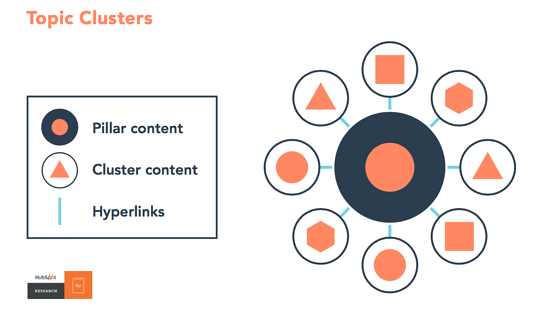Here’s why your business needs an inbound marketing Growth Plan

If you fail to plan, you plan to fail.
Put simply, the preparation of any business marketing strategy is just as important as the implementation of it; a detailed and strategic digital marketing plan sets the foundation to successful marketing and, therefore, better results.
What's more, the way people are buying has changed. In fact, in today’s digital world, 60% of purchase decisions are made before customers even have a conversation with a sales rep.
As a result, traditional ‘safe’ marketing strategies are on the way out, with just 16% of marketers saying that outbound provides them with the highest quality leads for sales - which means the use of inbound marketing technology is on the rise.
The proof is in the pudding - 35% of salespeople say closing a deal is getting harder, whilst only 22% of businesses are happy with their current conversion rates.
And that’s exactly where inbound marketing comes in. Done right, inbound can give you the opportunity to think smarter, grow faster, and deliver powerful results.
So, it’s clear that your business needs an inbound marketing Growth Plan - without one, you’d struggle to see your goals and how to get there.
As a critical first step, creating an inbound marketing plan will help to align your objectives and set out a clear path to reach them.
Done right, inbound marketing technology can result in a 50% increase in website conversion rates, whilst email marketing has double the ROI of cold calling, networking or trade shows - meaning that inbound leads cost 61% less on average than outbound leads.
It’s no wonder then that 72% of marketing professionals think that relevant content creation is the most effective SEO tactic out there!
Having complete control over this process will ensure that you don’t lose sight of where your business is going. Yes, it can be time-consuming, but it is absolutely worthwhile.
From monthly tasks to more long-term actions, a marketing Growth Plan will cover everything you need to grow your business.
To find out more about what’s involved in an inbound marketing Growth Plan, read on…
1. Buyer personas
A persona is a semi-fictional representation of your target customer, based on research and real data. Essentially, they are who you are talking to. They are the reason your business exists. So, yeah, you can say they’re pretty important!
Why do you need to know your personas?
Identifying your persona’s goals, challenges, and skill set will help you to understand your customer base. This will enable you to create highly targeted marketing messages. From Facebook ads to emails, website copy to blog content, everything you write will need to have your personas at the forefront.
Appealing to your personas will ensure you get your marketing right, from the outset. Here’s what you’ll need to find out in order to create your personas as part of your digital marketing plan:
- Demographic - age, gender, household income, work/life balance, personality, level of education, job title
- Goals
- Challenges/problems
- Questions they might ask you
- How they investigate solutions to their problems (e.g. Google search)
- Who/what influences them during their buying process
2. Your competitors
Of course, keeping an eye on what your competitors are doing is an essential part of running a business - you don’t want to be missing out or falling behind!
But why do they need to be included in your inbound marketing Growth Plan?
Carrying out an in-depth review of your competitors’ websites and digital marketing channels (social media etc.), you’ll be able to see what they are, or aren’t, doing.
Consider:
- Do they have a blog?
- Do they have clear CTAs?
- Do they use landing pages?
- What are they advertising?
- What are their search terms and keywords?
- Who’s linking to their website? (industry experts?)
- What’s their domain score?
- How easy is their website to navigate?
- How often are they posting on social media, and are they tagging other people in their posts?
Understanding your competitors so thoroughly could provide you with opportunity - what are they not doing, that you could? This allows you to tailor your approach to digital marketing.

3. Keyword research
Without keywords, you can’t optimise your website. Without optimisation, you won’t rank well on Google. So, find out what words and phrases people are typing into search engines to find what they’re looking for. Knowing your persona’s problems will enable you to find out what they’re searching for to find a solution.
You need to:
- Draw up a list of keywords,
- Making sure you’re taking into consideration the right balance between how many people are searching for the phrase (volume), and how competitive it is (difficulty).
- Research your competitors’ keywords - do any of these apply to you?
Why do you need to carry out keyword research?
Well, you need to create a content strategy around your keyword groups and optimise your site accordingly so you can start to attract more visitors - an essential stage in an inbound digital Growth Plan! Your keywords will also influence what you write about on your blog to attract your target audience.
4. Content strategy
Taking what you’ve learnt from researching your buyer personas and keywords, you can then start to build a content calendar.
Why do I need a content calendar?
This will provide you with a clear month-by-month plan so you can continue to stay on track with your strategy. Creating high-quality content that is valuable to your personas at every stage of the buying cycle will help you to attract and engage your visitors.
Here’s what you need to include:
- Blog titles that directly answer some of the questions your customers may have.
- For every month of the year, identify which blog posts you’ll publish and share.
- A relevant keyword for each blog
Having a blog will make sure that you’re always providing helpful, valuable, and relevant content that your customers will engage with. Don’t forget to share each post on social media to ensure it reaches your current followers, too!
A clear content strategy in your digital marketing plan will also help to boost your SEO. SEO experts are now shifting to a ‘topic cluster’ model, where they take a more organised approach to content planning and structure. Having a content calendar will help you to map out your ‘topic cluster’.
Put simply, this model centres around a single ‘pillar page’, which is a nucleus for one overarching topic.
This page links out to multiple related pages or blog posts that have relevant keywords. Google likes this model because it proves that the content you’re producing is relevant and helpful for your readers.
Want to find out exactly how to build a content strategy? This blog post has all the answers!
5. Goal setting
Now, you can set your goals. These will, of course, be specific to your business, but it’s useful to follow these steps to ensure your goals are not only realistic, but achievable.
Identify where your business is currently at by asking the following questions:
- How many visitors are you getting?
- Where are they coming from?
- How many leads do you have?
- How many sales are you closing?
- Are you posting regularly on your blog and on social media?
- How effective is your website?
- What is your average deal size?
- How many new customers do you need to achieve your new business targets this year?
- What is your current conversion rate? Including traffic to lead, lead to quote, quote to closed deal.
This information helps you to set targets for the full sales funnel and you can then work backwards to see how much you need at each stage of the funnel to reach your goal.
If you don’t have this data, then your first inbound marketing Growth Plan needs to be about getting measurement in place and setting up your marketing tech to allow for this. Once you have pulled this data, you can then set yourself goals, and how exactly you will achieve them.
How to give your Growth Plan the best chance of success
There’s a lot to think about when creating your Growth Plan, and it can take up a lot of time - especially when it is so important to make it work!
So how do you keep your Growth Plan alive all year?
Well, this is half the battle. It’s all well and good having a great digital marketing plan, but actually implementing it, and ensuring that your keep on implementing it throughout the year, will be the real challenge.
To get a good ROI when it comes to your inbound marketing Growth Plan, you’ll need to work hard to stick to it. Remember - it’s a marathon not a sprint!
So, if you need help with creating an effective Growth Plan, we offer a free marketing report and one-hour consultation with one of our inbound experts to get you started.
Within this report, you’ll get:
- Website analysis
- Content review
- SEO audit
- Social media review
Interested? Just submit this form to request your report today.

Ready to Unlock AI SEO for Your Business?
AI SEO isn’t coming — it’s already here. Capture high-intent traffic and build sustainable pipeline growth.
Get Your Free Audit

.jpg?width=1280&name=action-plan-brainstorming-complex-212286%20(1).jpg)


